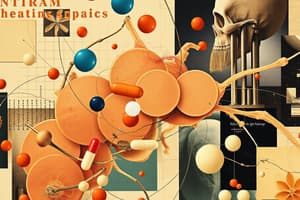Podcast
Questions and Answers
What branch of pharmacology deals with the therapeutic effects of drugs?
What branch of pharmacology deals with the therapeutic effects of drugs?
- Pharmacokinetics
- Pharmacotherapeutics (correct)
- Pharmacodynamics
- Pharmacology
Which of the following best defines pharmacokinetics?
Which of the following best defines pharmacokinetics?
- The study of drug absorption, distribution, metabolism, and excretion (correct)
- The study of drug-drug interactions
- The classification of drugs by their chemical structure
- The study of drug effects on the body
Which type of drug is intended to alleviate symptoms without curing the underlying disease?
Which type of drug is intended to alleviate symptoms without curing the underlying disease?
- Diagnostic
- Preventive
- Curative
- Palliative (correct)
What is the first phase of the drug development process?
What is the first phase of the drug development process?
What does Therapeutic Drug Monitoring (TDM) primarily involve?
What does Therapeutic Drug Monitoring (TDM) primarily involve?
Which trend focuses on tailoring drug therapy to individual patient characteristics?
Which trend focuses on tailoring drug therapy to individual patient characteristics?
Which professional role collaborates with others to ensure safe and effective medication use?
Which professional role collaborates with others to ensure safe and effective medication use?
What should be monitored to avoid potential side effects and interactions of medications?
What should be monitored to avoid potential side effects and interactions of medications?
Flashcards are hidden until you start studying
Study Notes
Pharmacotherapeutic
-
Definition:
- Pharmacotherapeutics is the branch of pharmacology that deals with the use of drugs to treat diseases and the therapeutic effects of those drugs.
-
Key Concepts:
- Drug Classification:
- Drugs are categorized based on their therapeutic use, mechanism of action, chemical structure, etc.
- Pharmacokinetics:
- Study of drug absorption, distribution, metabolism, and excretion (ADME).
- Pharmacodynamics:
- Study of the biochemical and physiological effects of drugs and their mechanisms of action.
- Drug Classification:
-
Therapeutic Uses:
- Curative: Aimed at curing diseases (e.g., antibiotics for infections).
- Palliative: Alleviates symptoms without curing (e.g., pain relievers).
- Preventive: Prevents disease onset (e.g., vaccines).
- Diagnostic: Aids in diagnosing conditions (e.g., contrast agents in imaging).
-
Drug Development Process:
- Preclinical Research: Laboratory and animal studies to evaluate efficacy and safety.
- Clinical Trials: Phases I-IV to test drugs in humans for safety, efficacy, and dosage.
- Regulatory Approval: Drugs must be approved by regulatory bodies (e.g., FDA).
-
Therapeutic Drug Monitoring (TDM):
- Involves measuring drug concentrations in the blood to optimize therapy and minimize toxicity.
-
Patient Considerations:
- Individual Variability: Genetic, age, sex, and health status can affect drug response.
- Adverse Effects: Potential side effects and drug interactions should be monitored.
- Compliance: Adherence to prescribed therapeutic regimens is crucial for effectiveness.
-
Emerging Trends:
- Personalized Medicine: Tailoring drug therapy based on individual characteristics.
- Biologic Drugs: Increasing use of biopharmaceuticals, including monoclonal antibodies.
-
Clinical Pharmacology:
- Focuses on the application of pharmacotherapeutic principles in clinical practice, ensuring safe and effective use of medications.
-
Professional Roles:
- Pharmacists, physicians, and other healthcare providers collaborate to create effective treatment plans based on pharmacotherapeutic knowledge.
Pharmacotherapeutic Overview
- Pharmacotherapeutics focuses on utilizing drugs to treat diseases and understanding their therapeutic effects.
Drug Classification
- Drugs are grouped based on therapeutic use, mechanism of action, or chemical structure.
Pharmacokinetics and Pharmacodynamics
- Pharmacokinetics explores the absorption, distribution, metabolism, and excretion (ADME) of drugs.
- Pharmacodynamics examines the biochemical and physiological effects of drugs and their mechanisms of action.
Therapeutic Uses of Drugs
- Curative: Designed to cure diseases (e.g., antibiotics for infections).
- Palliative: Provides symptom relief without curing the underlying issue (e.g., pain relievers).
- Preventive: Prevents disease occurrence (e.g., vaccines).
- Diagnostic: Assists in diagnosing medical conditions (e.g., contrast agents for imaging techniques).
Drug Development Process
- Preclinical Research: Involves laboratory and animal testing to assess drug efficacy and safety.
- Clinical Trials: Conducted in four phases to evaluate drugs in humans concerning safety, efficacy, and dosage.
- Regulatory Approval: Drugs must receive authorization from regulatory authorities like the FDA before market entry.
Therapeutic Drug Monitoring (TDM)
- TDM measures drug levels in blood to fine-tune therapy and reduce risk of toxicity.
Patient Considerations
- Individual Variability: Responses to drugs can vary due to genetics, age, sex, and overall health.
- Adverse Effects: Monitoring is essential for potential side effects and drug interactions.
- Compliance: Following prescribed regimens is vital for effective treatment outcomes.
Emerging Trends
- Personalized Medicine: Tailors drug therapies to individual patient characteristics for improved efficacy.
- Biologic Drugs: Rising use of biopharmaceuticals, including monoclonal antibodies, in treatments.
Clinical Pharmacology
- Applies pharmacotherapeutic principles in clinical practice to ensure medications are used safely and effectively.
Professional Roles
- Collaboration among pharmacists, physicians, and healthcare providers is crucial for developing effective treatment plans leveraging pharmacotherapeutic insights.
Studying That Suits You
Use AI to generate personalized quizzes and flashcards to suit your learning preferences.




